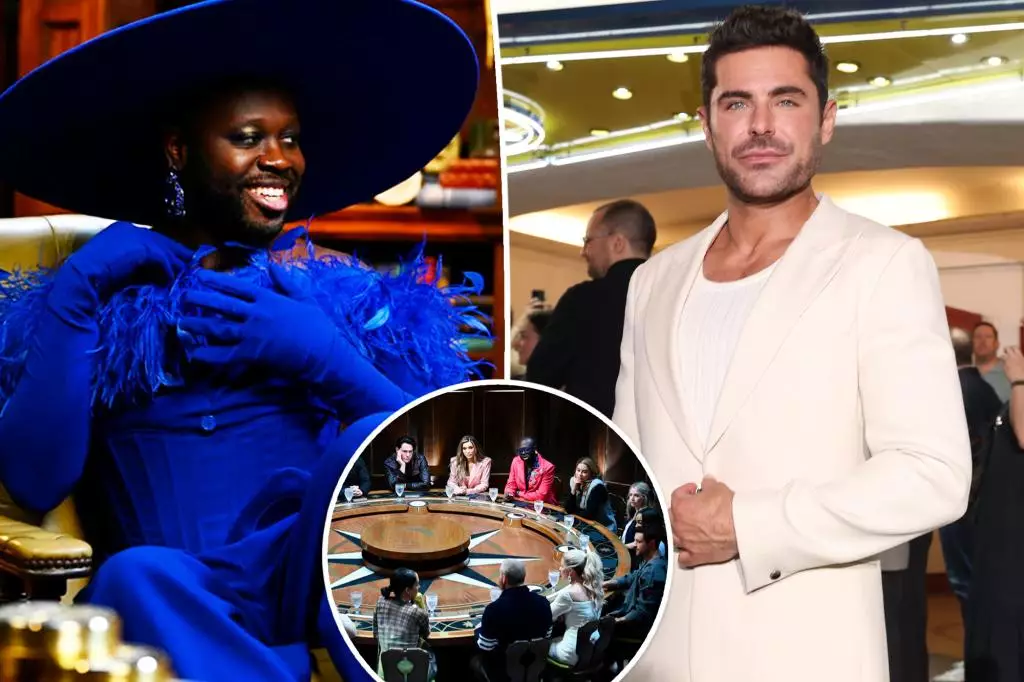In a highly publicized episode of Peacock’s reality competition series “Traitors,” a remarkable exchange took place between drag artist Bob the Drag Queen and Dylan Efron, brother of Hollywood heartthrob Zac Efron. Set against the backdrop of Scotland’s stunning Ardross Castle, the roundtable confrontation escalated quickly into a battle of wits, revealing both personal insights and professional rivalries. Dylan, armed with a straightforward approach, voiced his suspicion that Bob was playing the game as a traitor. “What would Bob do?” he mused, commenting on the strategic subtleties at play in the game, but what followed was a sharp rebuttal that showcased Bob’s comedic timing.
Bob the Drag Queen’s biting remark about Zac Efron’s acting abilities cut deep, illuminating the fierce loyalty Dylan holds toward his brother. While Dylan had described Zac as “an amazing actor,” Bob’s playful yet stinging critique, “Not a good one,” called into question the validity of that praise. The playful banter not only entertained the audience but also spotlighted the competitive nature of familial relationships and how those dynamics spill over into public portrayals. By juxtaposing Bob’s flamboyant persona with Dylan’s more reserved demeanor, the situation became emblematic of the differing approaches to fame and performance in reality television.
Dylan’s ability to persuade others to view Bob as the traitor elevated his status among the cast. With the assistance of strategic player Boston Rob, he managed to convince the majority that Bob was indeed guilty of deception, leading to Bob’s dramatic exit from the game. This development showcased Dylan’s potential for manipulation—a necessary skill in the realm of reality TV, where alliances shift as quickly as loyalties. The episode indicated that Dylan, despite his background predominantly behind the scenes in production, has the charisma and strategic ability to thrive in front of the camera as well. His influence led to praise from notable figures, including Dolores Catania from “Real Housewives of New Jersey,” solidifying his emerging reputation.
Delving into the Efron brothers’ relationship reveals a nuanced tapestry woven together by admiration and contrasting career paths. Though Dylan acknowledges Zac’s extraordinary ability to transform into different characters, he emphasizes the distinct skillset required for his own role in production and stunts. While Zac shines on screen as a performer, Dylan thrives in the shadows as a behind-the-scenes operator, finding his niche in production coordination and stunt work. Their conversations convey mutual respect, but they also highlight the persistent question of what it means to be ‘successful’ in the industry.
As the episode concluded, Zac expressed unwavering support for Dylan’s participation in “Traitors,” indicating a sense of familial pride that transcends competition. His prediction that Dylan would emerge victorious resonates with a growing awareness of the importance of shared narratives and family legacies in the entertainment world. This dynamic suggests that, albeit through starkly different paths, the siblings share a unified ethos centered around determination and adaptation, embracing the unique challenges posed by their respective roles in the industry.
Ultimately, this episode of “Traitors” not only entertained but also drew back the curtain on the complex relationships that define celebrity culture, showcasing how competition, loyalty, and artistry intertwine within the realm of reality television.

